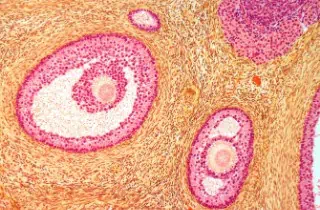The Role of Histamine and Mast Cells in PMS and PMDD

Mast cell activation and histamine can play a role in premenstrual syndrome (PMS) and premenstrual dysphoric disorder (PMDD).
That’s why mid-cycle, premenstrual, and perimenopausal mood symptoms can be relieved by antihistamines and natural histamine-reducing strategies such as quercetin, vitamin B6, SAM-e, and a dairy-free diet.
The Dos and Don’ts of Vitex for Period Problems
 Vitex (also called chaste tree or chasteberry) is a herbal medicine prepared from the berries of the Mediterranean tree Vitex agnus-castus. In ancient times, it was used to suppress the libido of monks, hence the name. Fortunately, it does not have that effect on women.
Vitex (also called chaste tree or chasteberry) is a herbal medicine prepared from the berries of the Mediterranean tree Vitex agnus-castus. In ancient times, it was used to suppress the libido of monks, hence the name. Fortunately, it does not have that effect on women.
Vitex is effective medicine for breast pain, irregular periods, premenstrual mood symptoms, and some types of acne.
The Downside to Contraceptive Injections and Implants

The progestins of contraceptive injections and implants can cause depression, weight gain, and irregular menstrual bleeding.
Side effects occur because 1) progestins are not progesterone, and 2) progestins at that dose can suppress ovulation and cause anovulatory bleeding. Keep reading to learn the difference between a real period, an anovulatory bleed, and a pill bleed.
PCOS Cannot Be Diagnosed (or Ruled Out) by Ultrasound

Polycystic ovary syndrome (PCOS) cannot be diagnosed by ultrasound because polycystic ovaries are not cysts. They’re follicles or eggs which are normal for the ovary.
It’s normal for all women to sometimes have a higher number of follicles. It’s normal for young women to always have a higher number of follicles because young women have more eggs. That’s why PCOS cannot be diagnosed by ultrasound. At the same time, PCOS cannot be ruled out by ultrasound because it’s possible to have normal-appearing ovaries on ultrasound and still have the hormonal condition PCOS.
How Phytoestrogens Can Lower Estrogen and Lighten Periods

Phytoestrogens are a special group of phytonutrients that occur naturally in most plant foods. The two major classes are isoflavones in soy, and lignans in seeds, whole grains, legumes, fruits, and vegetables.
They’re called phytoestrogens because they interact with estrogen receptors but they’re not estrogen. In fact, they bind so weakly to estrogen receptors that they effectively block estradiol and are therefore better categorized as anti-estrogen.
7 Ways to Support the Vagus Nerve and Improve Heart Rate Variability (HRV)

The vagus nerve is a cranial nerve that activates the parasympathetic nervous system and increases levels of oxytocin and the calming neurotransmitter acetylcholine. Supporting the vagus nerve and thereby improving parasympathetic tone promotes relaxation, sleep, digestion, and healing.
Activating the parasympathetic nervous system dials down the sympathetic nervous system or fight-or-flight response. In that way, the vagus nerve acts as a built-in “stress-reset button.”